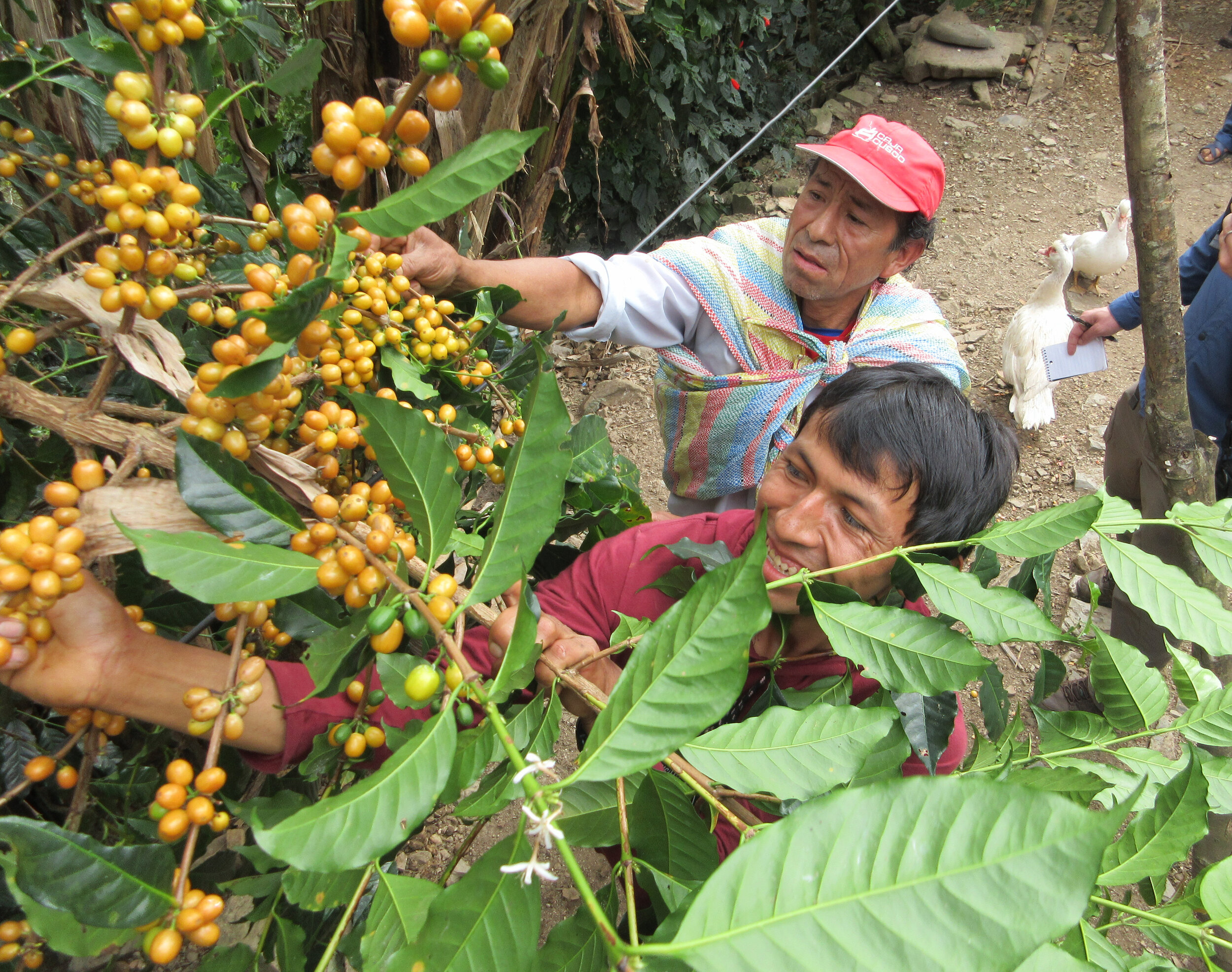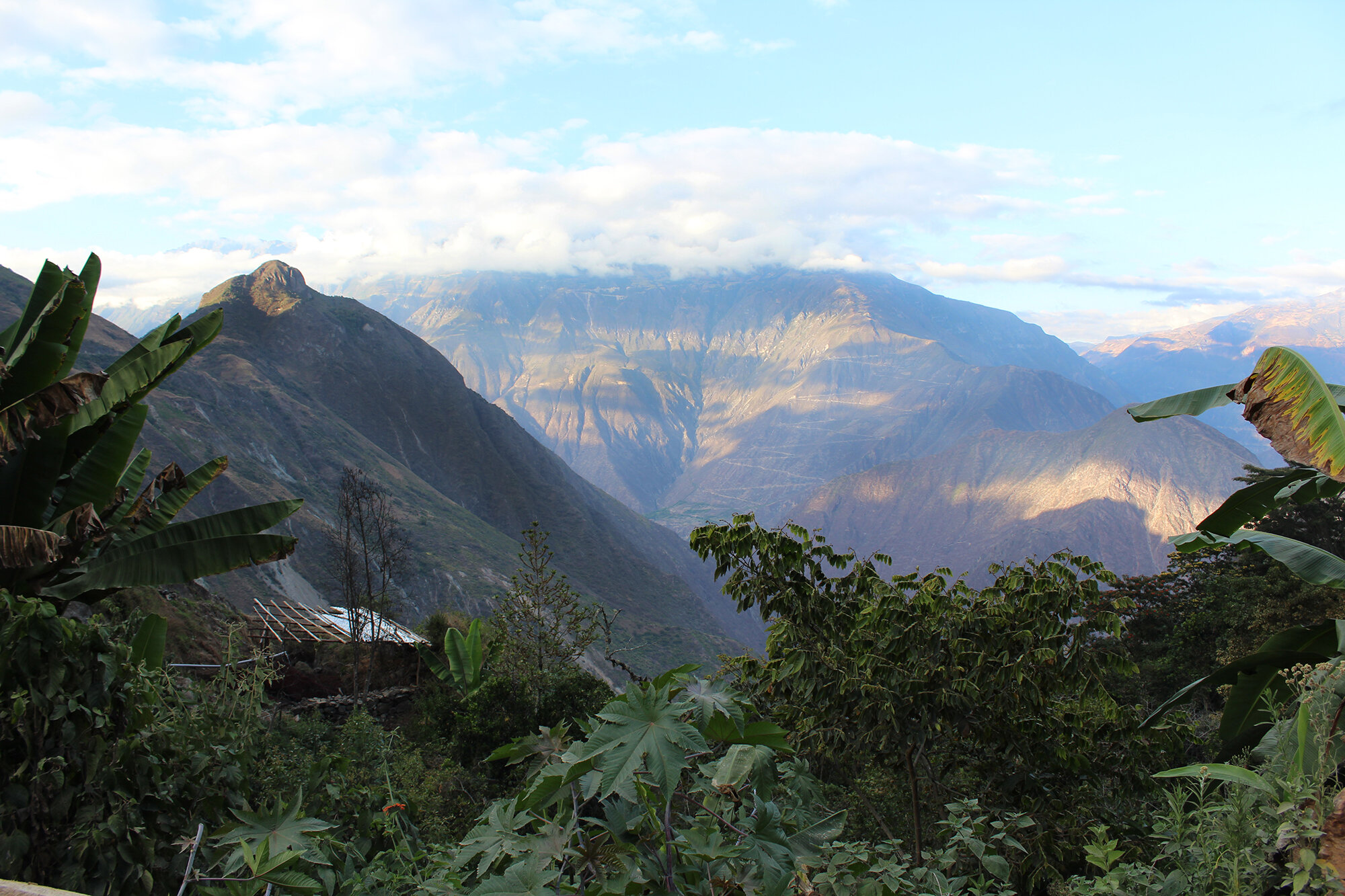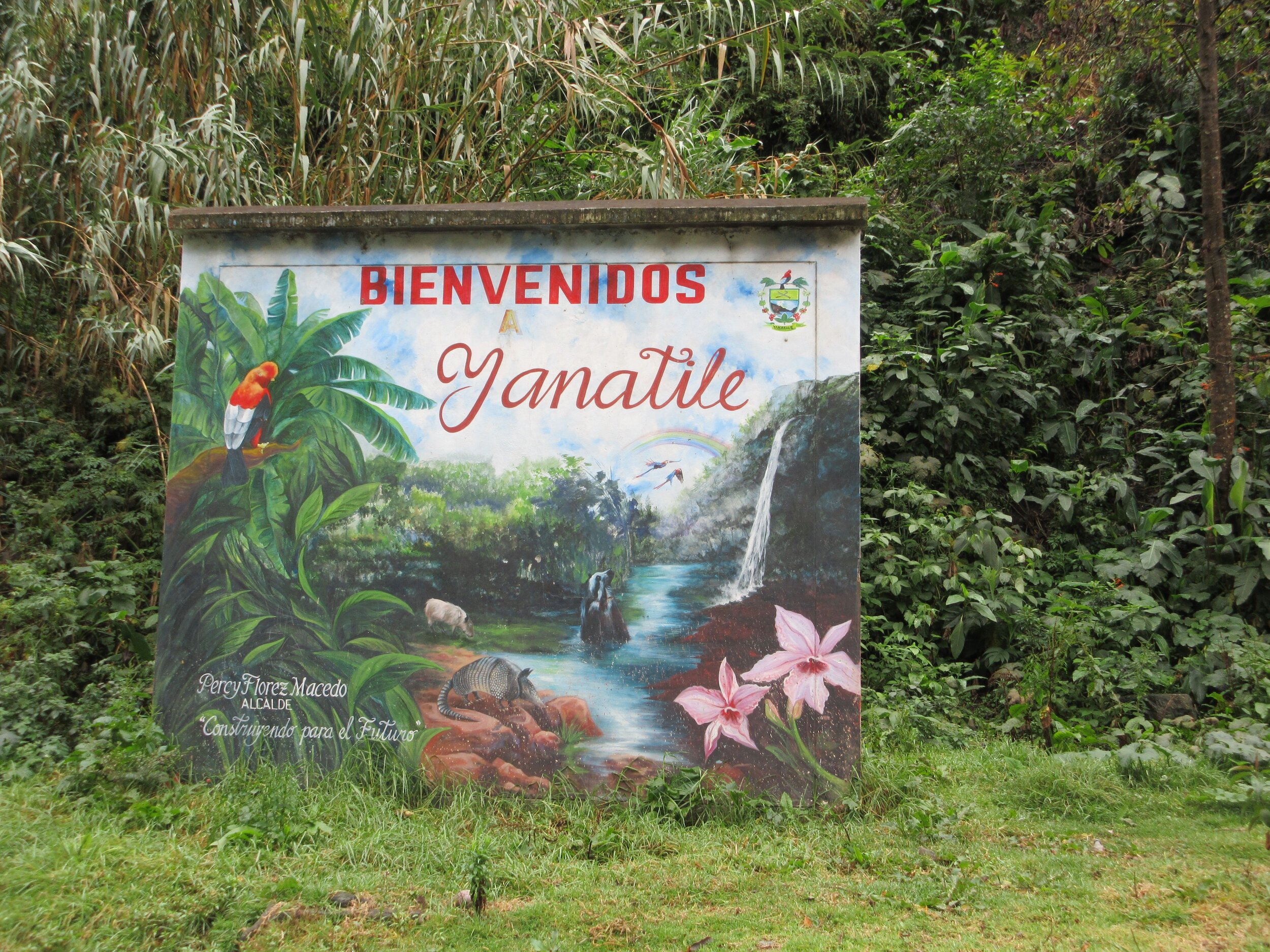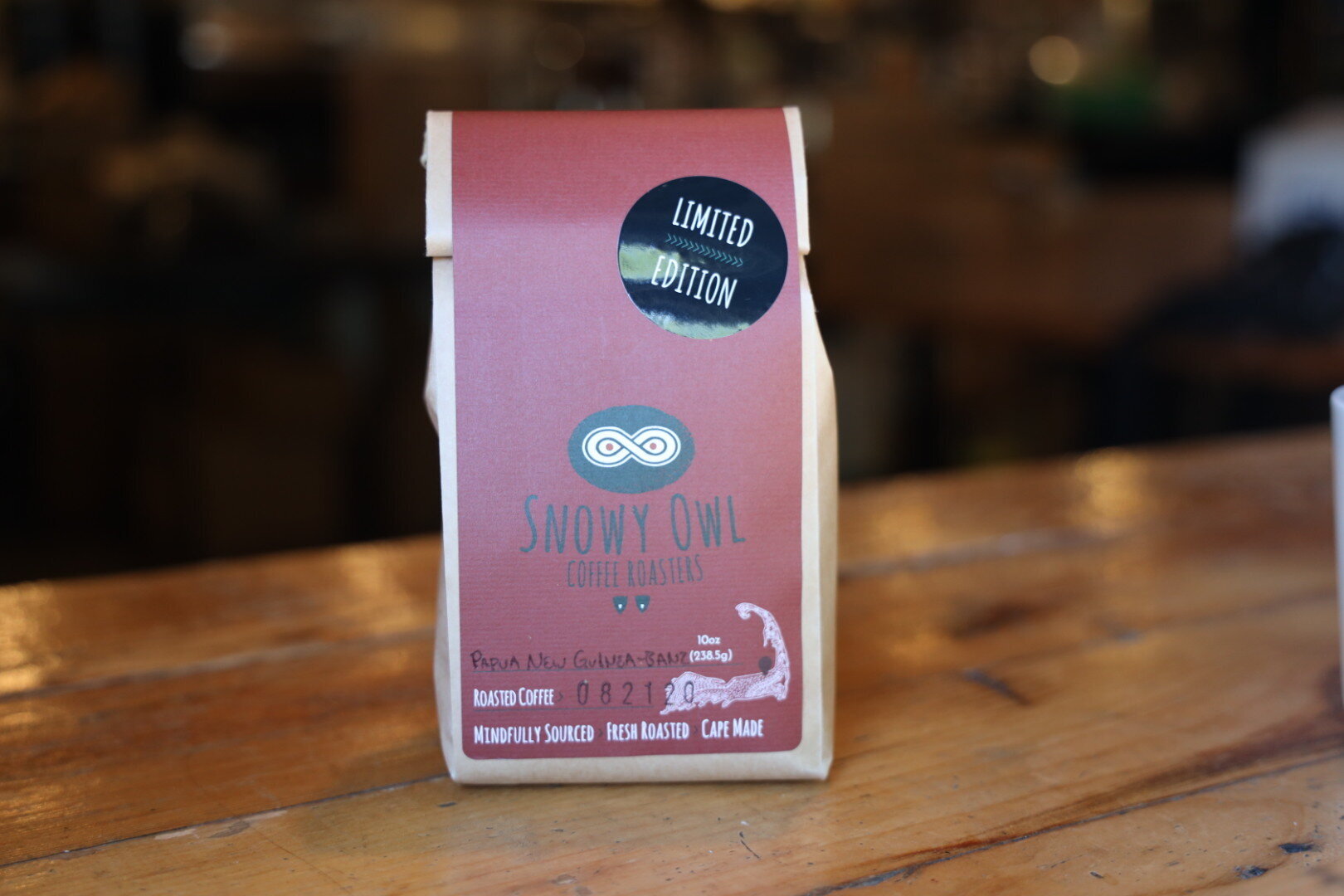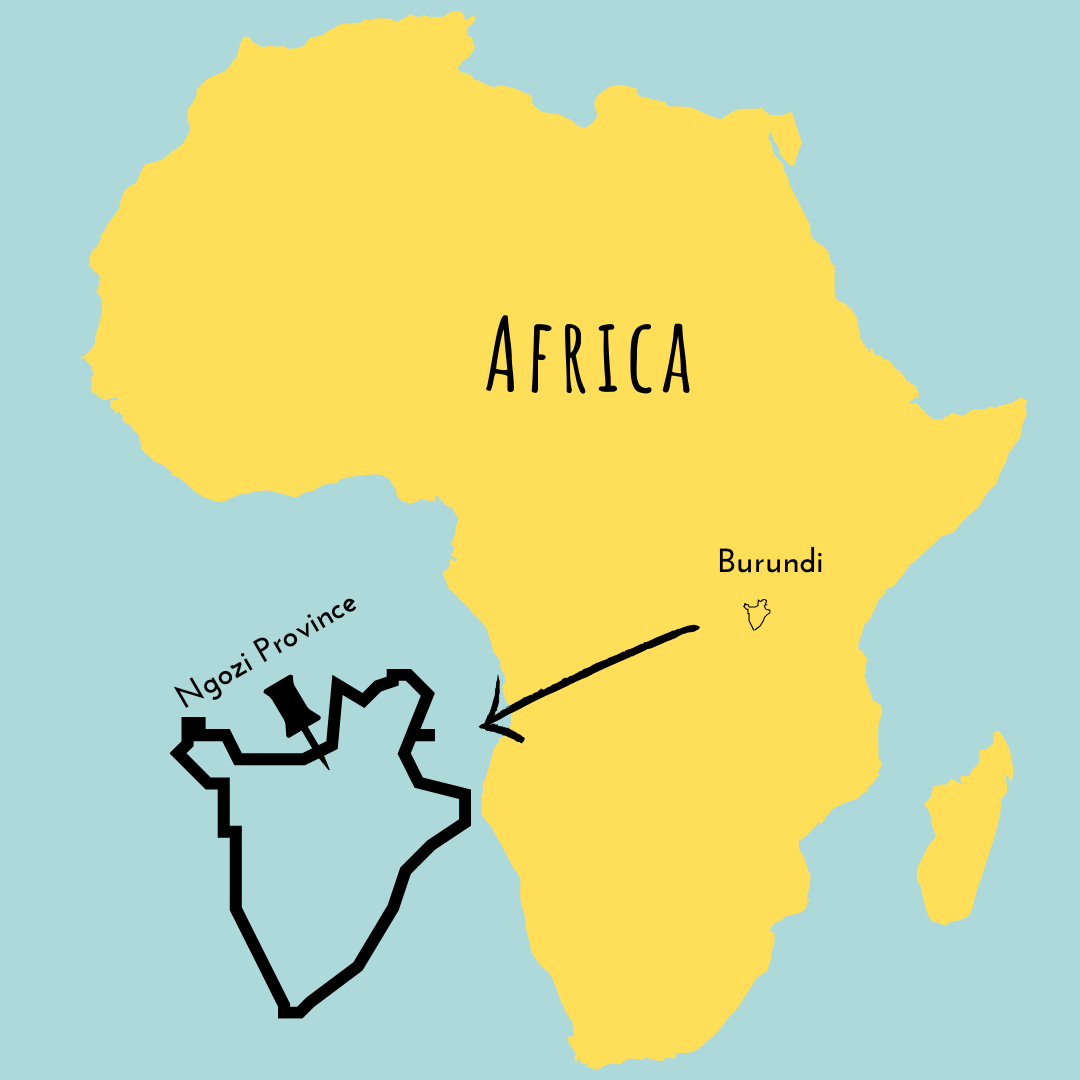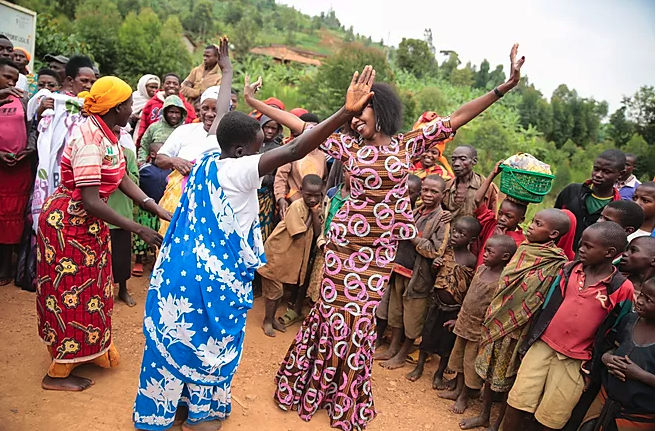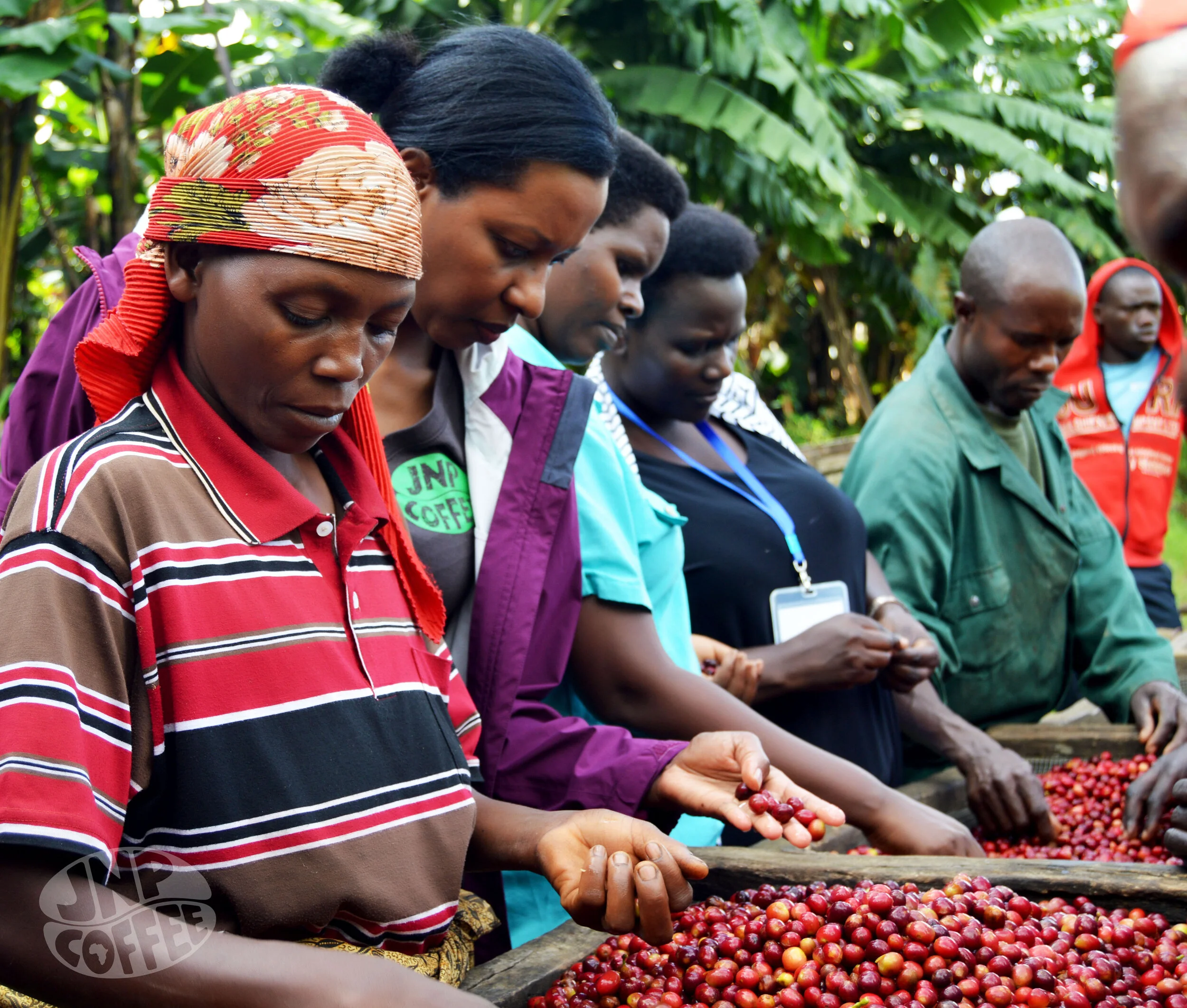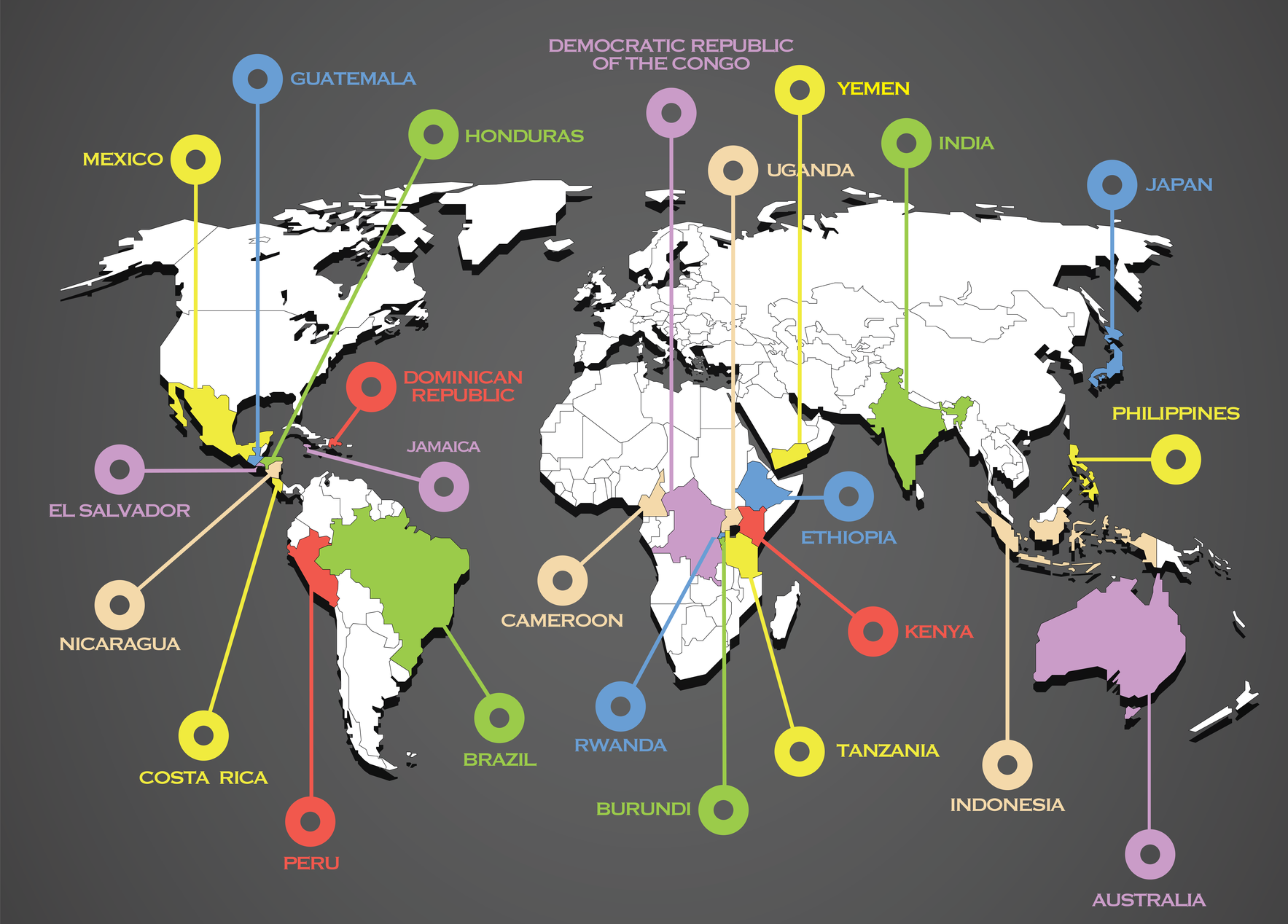Ethiopia Kolla Bocha
We're very excited about our new single origin offering, Kolla Bolcha, via our wonderful partners at Red Fox Coffee Merchants. An exceptional Ethiopian coffee, Kolla Bolcha came about partially because of the investment of the nonprofit organization Technoserve. Ten years ago, the Agaro region where Kolla Bolcha is grown was not known for high-quality coffee. What changed?
With the help of Technoserve, the farmers in Agaro were able to purchase a Penagos coffee pulper and began to adopt a washed process for their beans, rather than the natural process they used previously. The end result of the collaboration between the Ethiopian farmers and Technoserve is the coffee we enjoy today.
The farmers of the Agaro region are far from the only coffee growers who have benefitted from the assistance of Technoserve, which is why we'd like to highlight this exceptional organization and give consumers an awareness of who they are and what they do.
Technoserve was founded by American businessman and philanthropist Ed Bullard in 1968, while he was volunteering in Ghana. He realized that by providing underprivileged producers with access to funding and information (i.e. giving them access to the privileges he himself enjoyed) they would be fully capable of producing high-value products on their own.
Ed's intuition proved to be correct. Since the organization's founding, Technoserve has improved the lives of hundreds of thousands of producers in developing countries through training, funding, and market access. The organization has focused much of its effort toward empowering women in particular.
So successful has Technoserve been at achieving its mission, that in February of 2020, it was awarded the National Coffee Association's Charity of the Year award. Additionally, major nonprofit watchdogs Charity Navigator and GuideStar have consistently rated Technoserve highly. Technoserve also partners and coordinates with other aid organizations, notably USAID.
Snowy Owl is proud to recognize the efforts of Technoserve and to serve coffee that has been facilitated in part through their efforts.
Limited Edition: Rwanda Gatare Washing Station - Yego Coffee
District: Nyamasheke
Region: Kivu Belt, Nyungwe Edge
Altitude: 1542 - 1857 masl
Coffee Process: Natural
Water Source: Natural Spring
Flavor Notes: Lemon, Chocolate, Strawberry
This coffee comes to us from Yego Coffee and the Gatare Washing Station in Nyamasheke, Rwanda. Most of the farms that grow this coffee are located in areas surrounding Kivu lake near the Nyungwe forest at altitudes of between 1,542 – 1857 meters above sea level. The Gatare Washing Station runs like a business but feels like a family. Only 5 people out of its 25 person permanent staff have worked there for less than a decade. Because of this, Yego Coffee has chosen to source from this location and conduct their research and coffee tasting trials there. Gatare Washing Station was a pioneer in the natural and honey processes which has helped them perfect their practices. They work closely with the farmers in this area to increase their coffee quality and production amounts by helping plant new trees and providing financial and technical support. Due to its farm to cup model, Yego coffee sources with both the farmer and consumer in mind; ensuring that they are paying producers well above market price, while providing high grade specialty coffee to the consumer.
Yego Coffee, based out of Boston, MA was founded in 2019 by Francois Tuyishime. The word “Yego” is the Kinyarwandan word for “yes”. This word has special meaning for Francois and serves as a symbol of positivity and affirmation in Rwanda. This positivity has helped bring Rwanda and its people out of the darkness that was the 1994 genocide against the Tutsi. Francois was just six years old at the time of the genocide and like many, had to leave his village in western Rwanda in order to survive.
Francois’ family has been in the Rwandan coffee industry for over 40 years. His father used coffee not only as a means of income but as a way to build and support communities; a practice that was instilled in Francois through watching his father work alongside coffee farmers when he was young. Because of the teachings he learned from his father, a portion of the profits of Yego Coffee goes directly to providing lunches and covering school fees in coffee growing communities in southern and western provinces of Rwanda. A cup of this coffee is not only delicious, it also directly supports these rural farmers.
From Darkness to Light: How Yego Coffee Epitomizes Hope
Erupting out of the darkest era in history is a man with dignity and steadfast commitment to seeing tragedy bow down to goodness. Bolstered with confidence and pride, Francois Tuyishime walked into Snowy Owl coffee shop with one goal in mind— to get his family’s coffee onto our shelves. Over the course of the next few moments, we were presented with a vulnerable story of unyielding joy, courage, and strife.
In 1994, the Rwandan Genocide against the Tutsi people began. Francois and his family were under direct attack, living in a world of impalpable fear. Within one hundred days more than one million people were murdered and the homes of hundreds of thousands of people were defiled. Incomprehensible trauma swept over the Tutsi people in all of Rwanda, casting a blanket of grief, horror, and tragedy. At six years old Francois became a survivor of the Genocide.
While darkness and despair were consuming, the Tutsi people stood together with dignity. Yego, the word from Kinyarwanda meaning yes, became an anthem of hope, healing, affirmation, and positivity. The aftermath of the genocide still permeates the region but with a mindset transfixed on positivity, hope is being restored.
For over four decades, the Tuyishime family has harvested coffee. Coffee is the nation’s second leading source of income, and has provided a sustainable channel of security for Francois’s family. Fertile soil in Rwanda is highly competitive to acquire given the high population density, the abundance of crops being grown, and the nation being approximately the size of Massachusetts. After the area was ravaged, the Tuyishime family had to begin again from nothing. But coffee production is more than acquiring a sustainable income, it is a financial tool allowing the Tuyishime family to support and build up the local Rwandan communities.
Growing up, Francois’s father played a significant role mentoring Francois about coffee, business, and life. His father’s impact has set the trajectory of Yego Coffee by instilling in Francois the importance of recognizing that the coffee industry is more than creating profits. Francois went on to study at The National University of Rwanda where he graduated with a Bachelor of Arts in Political Science, and then pursued his Masters in Conflict Resolution from Brandeis University. The unique background of being immersed in coffee production partnered with educational achievements allows for Francois to actively participate in establishing long lasting and ethical relationships between New England coffee shops and the farmers in Rwanda.
Through our partnership, we are supporting Yego Coffee’s mission of supporting the Rwandan farmers. Currently, Francois operates two initiatives, Coffee Meals and Smile Girl. Coffee Meals provides school lunches for students attending the Busanze Primary School and Smile Girls provides sanitary pads for girls attending Busanze High School. Food insecurity and limited access to feminine menstrual products are two big needs in some of the Rwandan households. Currently these initiatives are directly providing for these specific needs, but Francois’s ultimate goal is to obtain relationships with roasters at competitive and equitable prices so the farmers are able to directly support all of their family’s expenses. Within ten years, it is Francois goal for every farmer to be financially empowered. We are proudly roasting Yego Coffee in our shops and excited to continue building our relationship with Francois.
Finca El Jardin: The Next Generation of Coffee Growers Bring a New Vision for the Future
On Finca El Jardin, residing deeper than the roots of coffee plants are the roots of family tradition. In 1918, Pablo del Cid’s great grandfather acquired a farm in the Fraijanes Plateau region of Guatemala. For over 100 years the del Cid family has managed the property that hosts complex and lush soil. Unwaveringly, the family has relied on its tried and true process of growing coffee, even though C Market prices have spiraled downward leaving it all but impossible to maintain a profitable coffee business. That is until Pablo boldly challenged tradition and took a lonely journey to bring the coffee of El Jardin to the next level.
Maintaining resilience and forging a new path for the Del Cid’s relationship to coffee is the foundation of Pablo’s pride, Quality Coffee. On his own micro-lot, Pablo experimented with processes to elevate the grade of his family’s coffee — studying the ins and outs of speciality coffee, trucking in high quality water, instituting new harvesting processes, tweaking, risk taking, and capitalizing on his mental stamina.
Growing up on the farm with his dad, Pablo learned the skills of fruitful harvesting. Still, harvesting coffee that meets the standards of speciality roasters was another challenge. Pablo pursued relationships with European roasters, but struggled to enter their markets. He went on to study in Sweden, researching speciality grade coffee and what it would require for his coffee to make it into the cups in curated shops. In Sweden he met his partner, Eva. Eva has played a dynamic role in supporting the development of Quality Coffee, and surprisingly, she was not a coffee drinker before meeting Pablo.
Remaining informed and involved with the intricacies of each process has led to Pablo’s success. Pablo and his team only process coffee from ripe cherries, which is not the norm in the surrounding area. With the help of local carpenters and blacksmiths, they’ve built greenhouses with raised beds and outdoor patios to dry their coffee. Refusing to take short cuts, Pablo has often chosen growing, harvesting, and processing methods that take longer, are more difficult than those used by traditional coffee farmers in his area, and are, at times, viewed with suspicion by previous generations of his family for contradicting traditional methods.
After a seven year hiatus, Pablo mastered his processes and is the first of his family to bring coffee to the United States. Quality Coffee is a story of perseverance, unyielding endurance, and giving back to the community. Despite conflicts that arose from blazing his own trail, Pablo intentionally invests in the local community to support the cultivation of more brave pursuits from the rising generation. Portions of Finca El Jardin have been donated to build a school in collaboration with the town’s Mayor. The school is named after the original owner of the land, Pablo’s great grandfather, Eusebio del Cid. Before the pandemic began, the school had 300 students from grades seven through nine. They hope that through the success of this and other coffees that this farm produces, they will be able to help contribute more towards the mission of ensuring all students have the supplies they need. We are proud to offer Finca El Jardin to our customers in store and online, and remain dedicated to providing our customers with coffee they can feel good about drinking.
Peru, Cusco; Hurtado Castro Gaspar; Valle Inca Cooperative; Red Fox Coffee Merchants (Copy)
Department: Cusco
Province: Calca
District: Yanatile
Community: Walla
Farm: Acsa
Producer: Hurtado Castro Gaspar
Cooperative: Valle Inca
Altitude: 1900 masl
Variety: Typica
Process: Washed
Harvest Period: June - September
Flavor Notes: Lemon, Chocolate, Green Apple
This is our second Peruvian coffee from the Valle Inca Cooperative in Cusco. Hurtado Castro Gaspar produces this particular washed coffee that is of the typica varietal at an elevation of 1,900 meters. Manuel is a part of the newly formalized Valle Inca Cooperative that is located in the Yanatile Valley. This cooperative is relatively new with 101 members and is quickly growing.
Valle Inca is led by Prudencio Vargas Saenz, a former agricultural loan officer. The knowledge he has from his previous work has greatly impacted how he operates Valle Inca. This cooperative was an informal group for many years, until this year when it was incorporated in order to gain organic certification, FairTrade certification, and the ability to export on its own. Valle Inca and Prudencio are well respected in the Calca province, due to Prudencio’s trustworthiness, dedication, and drive to invest in his community. He pays higher prices to his farmers to promote their stability, improving the health of the overall community and in doing so the coffee produced in these areas are almost always of a high quality. Due to the leadership of Prudencio, the value of this relationship he has with the producers shines through in each cup. Valle Inca produces consistently exceptional coffees that can satisfy the taste buds of a specialty coffee professional while still being approachable enough for the everyday coffee drinker.
Limited Edition: Mexico - Tzeltal Tzotzil
Altitude: 1460 masl
Varietals: Bourbon, Mundo Novo
Process: Washed
Harvest: November
Flavor Notes: Milk Chocolate, Grape, Brown Sugar
Fair Trade Certified
The Cooperativa de Produccion Tzeltal-Tzotzil is comprised of small family-owned and run farms located in the northern section of the Chiapas state. These farms are usually less than ten acres in size and produce honey in addition to coffee at an elevation of 1460 meters above sea level. Each farm in this organization has its own micro mill where they depulp, ferment, and dry their own coffee. The farmers and producers in the Cooperativa de Produccion Tzeltal-Tzotzil always work to maintain organic production methods to benefit the environment, increase the coffee’s quality, and increase their income to improve the livelihood of their families. A cup of this coffee yields sweet notes of milk chocolate, grape, and brown sugar.
Limited Edition: El Salvador - Jorge Reyes
Producer: Jorge Cruz Reyes
Coffee Farm: Finca Las Veraneras
Mountain Range: Apaneca - Ilamatepec
Altitude: 1,350 – 1,424 MASL
Varietal: Red Bourbon
Process: Natural
Agricultural Maintenance: Agroecological – Free of agrochemicals
This coffee was produced by Jorge Cruz Reyes at Finca Las Veraneras with the BioKrop Project by Tierra Bendita, an initiative of a consortium of various single-origin specialty microlot coffee farms across the six mountain regions of El Salvador. The coffee is produced under the technical advisory of Tierra Bendita, a small family business dedicated to agriculture in Western El Salvador. Its focus is to work with nature to improve the soil using microorganisms, compost and natural fertilizers with ancestral biodynamic practices. These agroecological farming practices yield healthy sustainable harvests in the production of coffee, cocoa, and honey. Harvest at Las Veraneras is key, as only the ripest coffee fruits are picked. The farm is well known for innovative fermentation and drying practices to create unique profiles. We are excited to share this coffee from our friends at Tierra Bendita with you. A cup of this medium bodied, natural process, red bourbon yields notes of candied orange, pecan, and green apple.
Limited Edition: Papua New Guinea Eastern Highlands Banz A
Elevation: 1585 – 1768 masl
Varietals: Arusha, Mundo Novo
Milling Process: Fully Washed
Drying Process: Patio and solar dried machine
Harvest Time: April – September
Approximately 30 small-holder farmers contribute to the coffee from this lot located at an elevation of between 1585 – 1768 meters above sea level. They bring their coffee to the Jiwaka Kofi Mill in Banz, located in the Waghi Valley. The combination of this high elevation and extremely fertile soil create a complex cup. This cup gives notes of brown sugar, dark chocolate, and a touch of grapefruit.
Honduras El Jaguar COHORSIL
Altitude: 1220 to 1524 masl
Varietals: Catuai, Catimor, Pacas, Typica
Milling Process: Fully washed
Harvest: December – May
Flavor notes: Almond, Dark Chocolate, Orange
This washed coffee is grown at altitudes between 1,220 to 1,524 meters above sea level in the Comayagua region of Honduras. COHORSIL or La Cooperativa de Horticultores Siguatepeque Limitada is a cooperative that was formed in 1980 by 12 vegetable farmers. They formed this cooperative in order to improve the quality of their produce by working transparently to help encourage other farmers to adopt their practices. Before COHORSIL was incorporated, the farmers in this area primarily grew vegetables, this changed in the 80’s when they decided to diversify their crops and take advantage of their altitude by planting coffee. Starting in 1989, members of the cooperative switched to growing coffee as their main crop. It is a constant goal of theirs to improve practices in order to elevate the quality of their coffee. A cup of this coffee will bring flavor notes of almond, dark chocolate, and orange.
Peru, Cusco; Manuel Patilla Carrasco; Valle Inca Cooperative; Red Fox Coffee Merchants
Department: Cusco
Province: Calca
District: Yanatile
Community & Farm: Chaquimayo
Producer: Manuel Patilla Carrasco
Cooperative: Valle Inca
Altitude: 2100 masl
Variety: Typica & Caturra
Process: Washed
Flavor Notes: Toasted almond, Cocoa, Orange
Manuel Patilla Carrasco has been producing coffee for 18 years, over half of his lifetime, on his family’s farm called Chaquimayo. He produces this particular washed coffee that is of the typica & caturra varieties at an elevation of 2,100 meters. Manuel is a part of the newly formalized Valle Inca Cooperative that is located in the Yanatile Valley. This cooperative currently has 101 members and is quickly growing.
Valle Inca is led by Prudencio Vargas Saenz, a former agricultural loan officer. The knowledge he has from his previous work has greatly impacted how he operates Valle Inca. This cooperative was an informal group for many years, until this year when it was incorporated in order to gain organic certification, FairTrade certification, and the ability to export on its own. Valle Inca and Prudencio are well respected in the Calca province, due to Prudencio’s trustworthiness, dedication, and drive to invest in his community. He pays higher prices to his farmers to promote their stability, improving the health of the overall community and in doing so the coffee produced in these areas are almost always of a high quality. Due to the leadership of Prudencio, the value of this relationship he has with the producers shines through in each cup. Valle Inca produces consistently exceptional coffees that can satisfy the taste buds of a specialty coffee professional while still being approachable enough for the everyday coffee drinker.
Burundi Coffee from JNP; Aligning our Hearts and Minds
For a nation which culturally prefers tea, Burundi has made a name for itself in the specialty coffee world.
Located in Central Africa, Burundi is a small landlocked country, and one of the poorest in the world. According to the World Bank, the average GDP per capita in Africa was $14,923, in Burundi, it is $293. 80% of the population lives in poverty, one of the highest rates in the world.
Coffee was brought to Burundi from the Belgian colonists in the 1930s; in the last few years, it has grown to be the nation’s largest export. Over 90% of the population is employed by the agriculture industry. Located on the equator in the northern part of the tiny country, the Ngozi Province’s mountainous region is conducive to dynamic and bright coffee. Grown at heights of 1,200 to 1,950 meters above sea-level, Burundi beans create a phenomenal cup of coffee.
Jeanine Niyonzima-Aroian, the founder of JNP Coffee, is working to change that reality. Originally from Burundi, Jeanine operates JNP coffee from Massachusetts, but makes regular trips to Burundi. Her mother’s family owned a coffee farm in Burundi, allowing her mother to go to school. Through such a strong personal connection to coffee and the opportunities the export can create for Burundians, Jeanine named the coffee product “Bavyeyi.” In the native Kirundi language, “bavyeyi” means “family.” In reference to her own family history, Jeanine works to ensure that the women who grow and cultivate the coffee receive equitable payment.
The success of Jeanine’s initiatives for the women in Burundi is a dream come true for her and her partners.. When Jeanine visits women growers, they always take time to dance together in celebration.
Jeanine and women growers sort through and select the ripest beans for drying
A country with a long history of political instability, violence, and poverty, Burundi continues to be a place where women are fighting for rights to own land.
Sorting through the cherries after they have been naturally sun-dried before they will be depulped and sold as green beans to roasters.
Jeanine has also partnered with numerous organizations and founded initiatives aimed at educating women and overcoming societal stigmas against female education. In Burundi, women cannot own property. In the current coffee market structure, women cannot directly receive payment for their work.
JNP Coffee sources the majority of her coffee from women who are members of the Burundi Chapter of the International Women’s Coffee Alliance (IWCA). The IWCA aims to support and empower women in the coffee industry. Formed in 2003, there are currently 25 operational chapter countries. From Mexico to Vietnam, the IWCA seeks to provide women the opportunity to lead prosperous and sustainable lives.
Through sourcing its coffee through the IWCA, JNP Coffee provides payment and premiums directly to the women farmers. In the Burundi chapter, there are over 600 women growers who benefit from a direct premium payment system. On average, women reinvest 90% of their income back into their families and community. While the laws surrounding female ownership of land are in the reformation process in Burundi, the partnership with the IWCA ensures that women receive the payment they deserve, today.
We met Jeanine a few summers ago, when she and her family came into the Brewster cafe while on vacation here on Cape Cod. After just a few minutes of chatting, we realized this was someone who knew more about coffee than we did; we were immediately impressed by her women empowerment initiatives at source. She left us samples, and the rest is history. Nowadays, Jeanine is a very well-known name, and has elevated Burundi to coveted status of excellence in the world of specialty coffee. Big roaster names, such as Blue Bottle and Intelligentsia, would scoop up all of her green beans if she let them. She doesn’t; she cares about the small companies like ours and reserves enough beans Snowy Owl Coffee to share with our supportive customers. For that we are more than grateful.
Through the partnership with JNP Coffee, all Burundi coffee at Snowy Owl is grown on small production lots without genetic modification. Washed in fresh mineral-rich spring water and prepared and processed in the same day, the Bavyeyi bean is natural, fresh, and organic.
Welcome to the Mighty Peace Trade
How Your Coffee Upholds Peace, Environmental Sustainability, and Human Rights.
Women-owned. Sustainable. Irresistible. Mighty Peace Coffee has set out to provide the Snowy Owl Coffee community, and the specialty coffee world at large, an opportunity to purchase delicious coffee while helping to break the cycle of poverty in one of the most war-torn, neglected areas of the world, the Democratic Republic of the Congo (DRC). Too often known for prolonged political corruption and violence, the DRC is emerging as a pillar of the African coffee industry, producing coffee that is absolutely stunning.
As climate change continues to ravage coffee trees in African coffee magnates like Kenya and Ethiopia, the mountainous region of the Congo has been largely sheltered from these effects, providing an element of predictability and stability in a place that lives with constant uncertainty. The coffee we have purchased and roasted from Might Peace Coffee is from the Umoja Cooperative and is grown at 1,480-2,000 meters above sea level in the Kivu region. Aware of the effects of climate change, new trees are continuously planted, with an estimated life of over 100 years.
Operated by an all-female executive team, the 11,600 coffee farmers that make up the Umoja Cooperative are located on Lake Kivu; they share in the financial stability of the coffee trade. For many, coffee is their only source of income. And, thanks to technical training that they have received from partner Peace Cooperatives, these growers are excelling in the art of producing specialty, high grade beans for roasters in developed markets.
Imbedded in our core values here at Snowy Owl Coffee is the idea that our business can support livelihoods not only in our immediate community but along every step of the supply chain down to the growers in origin communities. The shared values of transparency and equitable commerce means that this is just the beginning of what we know will be a long and sustained partnership with Mighty Peace Coffee , who ensure that the Congolese farmer responsible for your coffee receives fair and equitable payments. Members of the community receive compensation well-above fair-trade requirements and the Snowy Owl community - including our customers - all share in paying premium prices to ensure everyone throughout the supply chain is adequately compensated with each purchase.
The DRC is emerging from decades of civil war, and the Kivu regions were ridden with and conflict. Many women in the Umoja cooperative are survivors of sexual assault. Through the coffee trade and partnership with Mighty Peace and roasters like Snowy Owl Coffee these victims are able to establish independent and secure livelihoods. Many farmers are able to build permanent housing and send their children to school through the Congolese ownership model.
“I use my earnings to pay my children’s school fees; four of them have finished high school and one is in the third year of nursing college” – Mr. Sengi Ndambusa
Mighty Peace calls their work the “Peace Trade.” Through providing direct means for financial stability and independence, the fair coffee trade is infusing stability into the previously turbulent state. Five years ago, the Congo experienced the first peaceful democratic transfer of political leadership. Today, the Congo has gained support from the United Nations, African business owner associations and the United States.
A Farmer’s Story
“Meet Victorina Kanane, one of the farmers who grows Peace Trade coffee for Mighty Peace Coffee. Victorina built a house, purchases clothes for her famiy, andn feels secure now that she doesn’t need to travel to find a client. Travel places her at a risk of attack. Victorina is now able to pay for her children’s school fees. She enjoys being able to work in shared field sand begin to buy her own fields” – Mighty Peace Coffee
In Swahili, the national language of the Congo, “umoja” means solidarity. At Snowy Owl, our love for our community extends beyond our Cape Cod family and especially to those most vulnerable in the supply chain; the growers. Reading about the devastation suffered in the DRC is enough to humble us, even as we face this COVID19 crisis. And, as the providers of a truly global product, we consider the coffee community at large to be our community. In solidarity with the 11,600 Congolese, Snowy Owl invites you to taste the richness of Congolese coffee.
Through your support of the Congolese cooperative, Umoja coffee is more than a great cup of coffee, it is a step towards global human rights and peace. We at Snowy Owl look forward to many more years of collaboration, partnership, and solidarity with the Umoja cooperative and welcome your support with your coffee purchase.
SWP Natural Ethiopian Decaf
Region: Sidamo
Producer: Smallholder Farmers
Farm: Smallholder Farms
Altitude: 1,800 meters above sea level
Varietal: Kurume, Dega, Wolisho
Process: Natural, Swiss Water Decaf
Harvest: November-March
Tasting Notes: Berry, Honey, Chocolate
This naturally processed Swiss Water decaf coffee comes from the Sidamo region of Southern Ethiopia. Smallholder farmers produce and harvest this coffee at an elevation of 1,800 masl, selecting only the ripe cherries individually by hand. They often rotate among trees every week or so, only choosing cherries that are at their peak ripeness. This coffee is made up of local varietals such as; Kurume, Dega and Wolisho. Coffees from this region are known for their sweet, fruity profile and this decaf coffee is no different as a cup of this coffee yields berry, honey, and chocolate flavor notes.
Sidamo, also known as Sidama, is not only a region but a tribal group. It is also a vast coffee producing agricultural area that contains the smaller but well-known subregions Yirgacheffe and Guji. Most coffees that come from this area come from one of the large co-ops in the Sidama Coffee Farmers Cooperative Union in the northwest of the Yirgacheffe subregion. This union is made up of 51 highly respected individual co-ops that each represent thousands of farmers.
Honduras, Santa Barbara; El Roble, Gabriel Leiva – Ally Coffee
Region: Santa Barbara
Producer: Gabriel Leiva
Farm: El Roble
Variety: Catimor
Process: Washed
Harvest: November – March
Elevation: 1,600 masl
Tasting Notes: Hibiscus, Lime, Currant
Gabriel Leiva lives and produces coffee with his family in the hills of Santa Barbara mountain in Los Andes, Santa Barbara, Honduras. Although the peak of this mountain reaches up to 2,600 meters above sea level, Finca El Roble is located at 1,600 masl. The densely forested area surrounding the farm is a part of a national park and just above Lake La Yojoa. This microlot is fully washed and dried on raised solar beds.
This coffee was prepped for export at Exportadora San Vicente located not far from Finca El Roble, on the shores of La Yojoa. Exportadora San Vicente is a family run business founded more than forty years ago and now works with over 200 producers from the area, many of which have won titles in the Honduras Cup of Excellence.
The region this coffee is produced in, Santa Barbara, extends from Honduras’ border with Guatemala into the central mountain highlands. Along with Santa Barbara Mountain, located in this region is the Reserva de Vida Silvestre Montaña Verde wild animal preserve. The rainforests in this area are known to have rich biodiversity. There are many small holder farmers in this region. Temperatures in this region maintain a range between 54°F - 72°F throughout the year and trees used to shade coffee include fruit trees, such as guava, and forest hardwoods, such as pine.
This coffee is currently available in-stores and for purchase online
Colombia, Nariño; El Obraje, Pablo Andres Guerrero – Ally Coffee
Region: Nariño
Producer: Pablo Andres Guerrero
Farm: El Obraje
Variety: Caturra
Process: Natural
Harvest: July
Elevation: 2200 masl
Tasting Notes: Toffee, Berry, Lemon
Hacienda El Obraje has been in Pablo Guerrero’s family for many years, originally producing wheat and grains until the government began importing them in the 1990’s. When this happened, Pablo and his team worked to find a different crop to produce, starting first with fruit trees. They tried this for 10 years but the challenges of bringing the fresh fruit to market made cultivation of apples and peaches unsuccessful. Pablo Guerrero then turned to coffee.
Pablo Guerrero was the first to bring coffee to the Tangua area, as its altitudes averaging around 2,200 meters above sea level were thought to be too high for coffee growth. The coffee he produces has a very unique flavor due to the farm’s high altitude and mineral rich soil of nearby volcanic mountains. Another uncommon aspect of El Obraje is the drastic range in daily temperatures, it can be as high as 90°F and as low as 46°F in one day. This considerable change in temperature impacts the density of the beans and causes the trees to grow smaller and more compact than coffee trees of the same (caturra) varietal in other regions of Colombia. Since his coffees have thrived, others in this region have begun to grow coffee as well.
When Pablo Guerrero first began cultivating coffee in 2000, he only produced conventional coffee and did not have a processing mill. By 2009, he built his own mill and transitioned to producing only specialty coffee. His background in architecture has helped him in the planning, building and organization of El Obraje. He uses two distinct methods to process his coffee, natural and washed. The natural process is used mostly in places with limited access to water; El Obraje does not receive adequate rainfall to only use the washed method of processing coffee. He developed an irrigation system from the farm’s retention pond to use on specific lots to combat this problem in the growing stage.
This coffee is currently available in-stores and for purchase online
Peru, Cusco – Lucmabamba; Huadquiña Cooperative - Red Fox Coffee Merchants
Region: Cusco
Province: La Convención
District: Santa Teresa
Community: Lucmabamba
Number of Producers: 11
Cooperative: Huadquiña
Altitude: 1800 – 2000 masl
Variety: Typica, Caturra, Bourbon
Process: Washed
Flavor Notes: Fig, Honey, Orange
Huadquiña cooperative is located in Santa Teresa, Cusco, Peru. It is near the base of the Templo de La Luna, an ancient Incan ceremonial temple, which is on the Urubamba river. Huadquiña started as a small operation in 1964 but since Red Fox Coffee Merchants began working with them in 2015, they’ve quickly grown with 11 producers contributing their harvests. Until recently the nearest major coffee trading hub, Quillabamba, which is about 90 minutes away from Huadquiña was ruled by a large cooperative union. This caused smaller cooperatives great difficulty in navigating the trade channels; because of this, the quality potential from this region went unnoticed and unrealized for many years. In 2015, the large ruling organization was disbanded, opening up the region to new trading opportunities that it had never experienced before. La Convención is far off the beaten path, a 6 hour drive to town through high mountain passes. The varietals found in this area are typically bourbon, typica and caturra and are produced at elevations between 1,800 – 2,000 meters above sea level.
This coffee is currently available in-stores and for purchase online
Brazil Cafe Delas - Olam
Region: Patrocínio, Cerrado Mineiro, Minas Gerais
Process: Natural
Some Farmers Include: Delza Resende de Castro Chagas of Quebranzol farm, Telma Batista Machado of Bom Jardim farm
Flavor Notes: Chocolate, caramel, dried fruits, pear
Café Delas is a program developed to help empower women in the coffee industry in Minas Gerais, Brazil. It is no secret that women are often invisible although not absent on coffee farms across the world. This initiative is geared towards giving coffee growing women a platform to have an equal voice in leadership and access to resources and knowledge that they need to grow their operations in the field. Olam, the coffee importer and creator of this program found that women are more likely to invest their income back into their families and communities, improving education, nutrition, and health. All of the coffee produced by farmers in the Café Delas program can be traced back to women growers. Not only do women farm the land, they are in charge of all other aspects of the business. For every pound of coffee purchased from Café Delas, Olam reinvests 3 cents into initiatives that promote gender equality and the empowerment of women in the coffee industry.
Burundi Bavyeyi Ngozi - JNP
Region: Ngozi Province
Variety: Natural Bourbon
Altitude: 1800 m ASL
Process: Natural
This direct trade coffee is grown in the Ngozi Province of Burundi at an altitude of 1,800 meters above sea level. This natural bourbon varietal is grown, harvested and processed by a woman-owned cooperative that has more than 600 members mainly comprised of Muslim women. JNP coffee is a company that produces and exports specialty coffee from Africa, primarily Burundi. The founder of JNP, Jeanine Niyonzima-Aroian, has roots in this particular province of Burundi. Her mother grew up in this province harvesting coffee on her family’s farm to cover school fees. This is the reason why this coffee is named, “Bavyeyi”, which means “parents” in Kirundi. JNP coffee has a relationship with the farmers and producers at the washing station, helping to improve practices that will strengthen crops and achieve higher cupping scores. This coffee is processed naturally, giving it a fruity flavor. This syrupy coffee offers notes of red fruit, brown sugar and vanilla.
Ethiopia Yirgacheffe Edido Washed - Olam
Subregion: Yirgacheffe
Wet Mill: Edido – managed by Abdulmejid Jibril
Process: Washed
Growing Altitude: 1800-2200masl
Flavor Notes: Lemon tea, strawberry, florals
This grade 1 washed coffee comes from the Edido washing station in the Yirgacheffe district of Ethiopia which is managed by Abdulmejid Jibril. There are 650 smallholder farmers that contribute to this station, bringing in their ripest cherries. All of these farms are located between 1,800-2,200 meters above sea level in the surrounding area. Washing stations like this give small scale coffee farmers the opportunity to sell their coffee to larger markets. Ethiopia is known as the birthplace of coffee, and Yirgacheffe is known specifically for producing high quality coffee. With the combination of high altitude, fertile soil, consistent and plentiful rains, and the locals’ proficiency in coffee growing, it has ideal growing conditions. Coffee thrives in the rich environment that the forests in this area provide.
Ethiopia Gelana Abaya Natural - Olam
Mill: Gelana Abaya dry mill, managed by Alemu Bukato
Region: Doko Chere Kebel, Gelana Abaya
Process: Natural
Altitude: 1,800-2,000 masl
Rainfall: 1,800-2,000 millimeters per year
Varietal: Indigenous heirloom
Flavor Notes: Red fruit, Honey, Jam
This grade 1 coffee is processed at the Gelana Abaya dry mill in the Doko Chere Kebel region of Ethiopia, which is managed by Alemu Bukato. 750 small scale farmers from the surrounding area bring their coffee to this mill to be dry processed. Each farmer has an average of 2 hectares of land to grow their coffee, with a harvest period between October and January. With 1,800-2,000 millimeters of rainfall each year and its naturally fertile soil, this region is ideal for growing coffee. This indigenous heirloom varietal is unique to this region and can be found growing in the wild. The coffees produced in this subregion of Yirgacheffe are known for their complex flavor and when processed naturally they have a juicy, jam-like flavor with a creamy body.




















